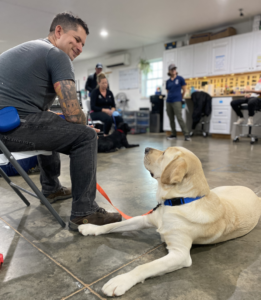 Warrior Canine Connection’s (WCC) MBTR training program, short for Mission Based Trauma Recovery, is the cornerstone of its mission. This unique volunteer-based, animal-assisted therapy involves Service Members and Veterans in training future service dogs. Besides knowing the dog will one day go on to help a fellow Veteran, many Warriors involved in MBTR cite their own benefits, including enhanced communication, confidence, accountability, emotional regulation, and patience.
Warrior Canine Connection’s (WCC) MBTR training program, short for Mission Based Trauma Recovery, is the cornerstone of its mission. This unique volunteer-based, animal-assisted therapy involves Service Members and Veterans in training future service dogs. Besides knowing the dog will one day go on to help a fellow Veteran, many Warriors involved in MBTR cite their own benefits, including enhanced communication, confidence, accountability, emotional regulation, and patience.
Mar Leifeld, WCC’s Veteran training program manager, who spearheads the MBTR program, says while MBTR volunteers have been instrumental in helping to train hundreds of WCC dogs, it has also been transformative in helping Veterans transitioning out of the military to restore a sense of purpose.
“This program is 100% voluntary, and the volunteer piece is really at the heart of what’s driving our Veterans to be involved in it,” said WCC Veteran Training Program Manager Mar Leifeld. “Everyone who is coming to engage in the program, whether they have a personal reason to be engaged, they’re all coming to an increased sense of purpose and community and to give back.”
In 2023, a total of 1,310 Veterans participated in MBTR across all locations, collectively contributing 10,077 hours of voluntary training. On average, each Veteran dedicated approximately 7.7 hours to the program.
The numbers don’t lie—MBTR is impactful. In fact, testimonials from previous participants inspired lawmakers to tap Rick Yount, founder and executive director, WCC, and Veterans Affairs to help draft the original language for what would become the current PAWS for Veterans Therapy Act, which President Biden signed into law in 2021.
Now in year three of a five-year pilot program, the impact of MBTR is being seen at five program sites that provide service dog training to benefit Veterans diagnosed with PTSD; WCC hosts two of the five sites.
While continuous research quantifies the impact of MBTR, participating Veterans have shared profound testimonials; from alleviating PTSD symptoms to enhancing concentration and fostering a sense of purpose, the MBTR program stands as a beacon of hope and healing for those who have served. But don’t just take our word for it, check out the Veteran participant testimonials below, all which have been shared anonymously.
“Training the dogs gave me time away from my PTSD symptoms. I was more focused on connecting with the dogs than my own symptoms,” shared one MBTR participant.
“Before I began the 8-week program, I was suffering from Major Depression. After numerous treatments including a variety of medications and 10 sessions of ECT, I was only minimally better. I was feeling numb for years and was unable to feel any joy. I never left my home and did not want to do anything, even bathing was difficult. My occupational therapist recommended WCC. I honestly did not want to go, but I forced myself. After the first two sessions, I finally began to have some sort of feeling for the first time in years. I now leave my home several times a week and I want to do some things. It is a work in progress, and I have plenty of bad days, but this is a breakthrough,” shared a Veteran participant.
“I thoroughly enjoyed the program and used some of the skills to train my dog at home. It is very enlightening, and one feels like they are contributing their efforts for an excellent cause,” shared an MBTR participant.
“I appreciate the time I was able to spend with the pups & trainers. They are lovely & caring. It was a wonderful reminder to slow down pay attention and breathe into the positive or negative situation/what my inner voice was telling/yelling at me.”
“Training the dogs and learning how to train them in some of their tasks really helped me with concentration and slowing my mind down. I suffer from PTSD, TBI and anxiety amongst other things. My wife literally said the one day I was always in a good mood was the day I had an hour with the dogs. Before or after going.”
“Training the service dogs gave me a sense of purpose; connectedness with fellow veterans, instructors, and dogs; increased my mood; helped me be patient with my own dogs; gave me a sense of pride that I could contribute to society (I told my friends all about the program); made me more interested in other areas of my life again like sports and hiking with my dogs; it inspired me to take more dog training classes (animal CPR and obedience classes for my dogs); it made me feel like the VA cares about veterans with PTSD; I felt loved by the animals and instructors. Overall, this program made helped me feel good about myself again, purposeful and confident in myself.”
Learn more or get involved in WCC’s MBTR program here.
###
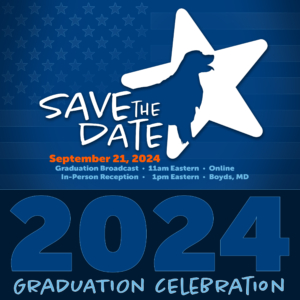 WCC happily invites current and past graduates, their families, our amazing volunteers and supporters and everyone who wants to rally behind our largest graduating class, to join us for WCC’s Class of 2024 virtual ceremony on Saturday, Sept. 21.
WCC happily invites current and past graduates, their families, our amazing volunteers and supporters and everyone who wants to rally behind our largest graduating class, to join us for WCC’s Class of 2024 virtual ceremony on Saturday, Sept. 21.  We are privileged to introduce you to U.S. Navy IT3 Keisha Peterson-Anderson, whom we met through Warrior Canine Connection’s (WCC) Mission Based Trauma Recovery (MBTR) training program in partnership with Wounded Warrior Project (WWP). We are honored to share her Warrior story.
We are privileged to introduce you to U.S. Navy IT3 Keisha Peterson-Anderson, whom we met through Warrior Canine Connection’s (WCC) Mission Based Trauma Recovery (MBTR) training program in partnership with Wounded Warrior Project (WWP). We are honored to share her Warrior story. Warrior Canine Connection’s (WCC) MBTR training program, short for Mission Based Trauma Recovery, is the cornerstone of its mission. This unique volunteer-based, animal-assisted therapy involves Service Members and Veterans in training future service dogs. Besides knowing the dog will one day go on to help a fellow Veteran, many Warriors involved in MBTR cite their own benefits, including enhanced communication, confidence, accountability, emotional regulation, and patience.
Warrior Canine Connection’s (WCC) MBTR training program, short for Mission Based Trauma Recovery, is the cornerstone of its mission. This unique volunteer-based, animal-assisted therapy involves Service Members and Veterans in training future service dogs. Besides knowing the dog will one day go on to help a fellow Veteran, many Warriors involved in MBTR cite their own benefits, including enhanced communication, confidence, accountability, emotional regulation, and patience.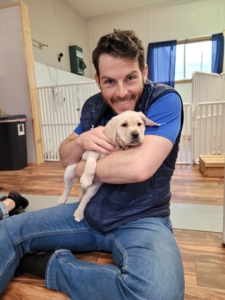 Today we introduce you to U.S. Air Force Captain (ret.) Andrew Miller. He’s a Veteran who Warrior Canine Connection (WCC) had the pleasure of meeting through its Mission Based Trauma Recovery (MBTR) training program in partnership with Wounded Warrior Project (WWP). We are honored to share his story.
Today we introduce you to U.S. Air Force Captain (ret.) Andrew Miller. He’s a Veteran who Warrior Canine Connection (WCC) had the pleasure of meeting through its Mission Based Trauma Recovery (MBTR) training program in partnership with Wounded Warrior Project (WWP). We are honored to share his story.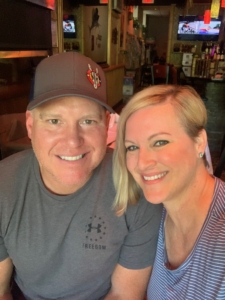 Three years ago, as she was being rushed into emergency surgery at Walter Reed National Military Medical Center during the COVID pandemic, doctors told U.S. Air Force Major (ret.) Molly O’Connell and her husband that there was a chance she may not walk again — it would depend on the severity of the damage to her spinal cord.
Three years ago, as she was being rushed into emergency surgery at Walter Reed National Military Medical Center during the COVID pandemic, doctors told U.S. Air Force Major (ret.) Molly O’Connell and her husband that there was a chance she may not walk again — it would depend on the severity of the damage to her spinal cord. 
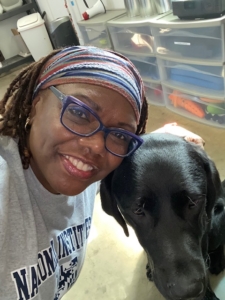 Today we introduce you to U.S. Air Force Major (ret.) April Ames-Chase. She’s a Veteran who Warrior Canine Connection (WCC) had the good fortune to meet through its Mission Based Trauma Recovery (MBTR) training program in partnership with Wounded Warrior Project (WWP). We are privileged to share her story.
Today we introduce you to U.S. Air Force Major (ret.) April Ames-Chase. She’s a Veteran who Warrior Canine Connection (WCC) had the good fortune to meet through its Mission Based Trauma Recovery (MBTR) training program in partnership with Wounded Warrior Project (WWP). We are privileged to share her story.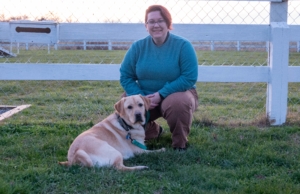 Air Force Veteran Amber Adams has always loved animals. Growing up, her family raised beagles, and now she has two cats of her own. So, when she saw an opportunity through Wounded Warrior Project (WWP) to be involved with Warrior Canine Connection (WCC) and help train future service dogs, she signed up.
Air Force Veteran Amber Adams has always loved animals. Growing up, her family raised beagles, and now she has two cats of her own. So, when she saw an opportunity through Wounded Warrior Project (WWP) to be involved with Warrior Canine Connection (WCC) and help train future service dogs, she signed up.

